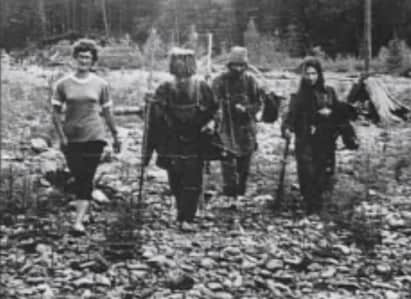Isolated Russian Family Survives in Siberia for 40 Years
OutdoorHub Reporters 01.31.13

In the summer of 1978, Russian geologists found more than they bargained for when they discovered the Lykov family in a remote forest 150 miles from the fringes of civilization. According to a story by Smithsonian.com, the geology team was sent to prospect for iron ore and had come across the family’s crude hut. It is hard to say who was more surprised, the scientists or the Lykovs, who had not seen an outsider for nearly 40 years.
At a loss for words, the team was greeted by an old man who said only, “Well, since you have traveled this far, you might as well come in.”
The 80-year-old patriarch of the family, Karp Lykov, brought the family into the wilderness in 1936 to escape religious persecution. He, his wife Akulina, and their two children traveled further and further inland into the vastness of the backcountry. The couple later had two more children, bringing the Lykov family up to two girls and two boys. Akulina passed away in 1961.
 The gear they had brought with them started to break down and the family had to fashion clothes from bark and hemp cloth, tools from rocks and wood. The rudimentary cabin they called home was constructed from scraps of bark and wooden planks the family peeled off nearby trees.
The gear they had brought with them started to break down and the family had to fashion clothes from bark and hemp cloth, tools from rocks and wood. The rudimentary cabin they called home was constructed from scraps of bark and wooden planks the family peeled off nearby trees.
Food was more difficult. The original seeds that the Lykovs carried into the wilderness provided for a few winters until wild animals destroyed their small farm. Siberia is a harsh land to live off. The family scrounged what wild berries and roots they could and eventually learned to hunt the wild animals nearby. Lacking firearms and even primitive bows, Karp’s two sons would prepare traps for small game. These traps were often simple holes with a layer of foliage to mask them, but as the boys grew more options became available.
 Dmitri, the youngest boy in the family of five, captured the geologists’ attention as a skilled outdoorsman. He impressed them with his log cutting and built many fixtures around the cabin from what resources he had, including the stove. Dmitri also practiced persistence hunting to keep his family fed. It often involved hunting barefoot in the snow for days before he caught anything, and only then by wearing the animal out until it collapsed of exhaustion. This method hasn’t been used by the majority of hunters since before the invention of the pointy stick some several thousand years ago. Dmitri often carried home young elk after being gone for a week or more, bolstering the family diet of potatoes and berries.
Dmitri, the youngest boy in the family of five, captured the geologists’ attention as a skilled outdoorsman. He impressed them with his log cutting and built many fixtures around the cabin from what resources he had, including the stove. Dmitri also practiced persistence hunting to keep his family fed. It often involved hunting barefoot in the snow for days before he caught anything, and only then by wearing the animal out until it collapsed of exhaustion. This method hasn’t been used by the majority of hunters since before the invention of the pointy stick some several thousand years ago. Dmitri often carried home young elk after being gone for a week or more, bolstering the family diet of potatoes and berries.
The scientists were unable to convince the Lykovs to come back to civilization, but they did return to see the family several times. In the present day only Karp’s daughter Agafia, in her 70s, remains. She lives not too far away from where the original cabin was found and has no plans to leave.

